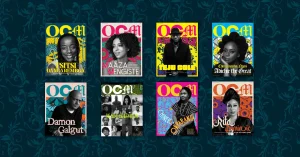It is a poignant joy to discover yet another young writer living on the continent with the talent and potential to measure with the established. The first time I read J. K. Anowe, one morning almost two years ago, we were in a small room, in a mutual friend’s apartment, and I had just met him. The friend had given me an unpublished poem of his to read. This was 2016, a time when I had only just re-found my interest in poetry. So I read it. There was something about his sensibility, like something rolling inside an egg, able to but reluctant to burst the shell. I didn’t say so then, partly because I didn’t grasp what it was entirely, not enough to comment on it. Months later, I was sitting before my laptop, working or pondering, when I settled on another of his poems. Six or seven phrases in, I felt a caving in me.
the gun speaks to its bullet—
go into the world & be the storm
be exit signs etched into Jesus
(from “Etc.”)
My mood deserted me. Was it the tone? Was it the abruptness? This young man was writing about something different. He was writing about our psyches, our mental illnesses and suicidal pulls, about our bodily indulgences, about masturbation, and in a language different from the lyrical-realism wording popularized by Warsan Shire.
it wasn’t a metaphor when I said i’d give you the world to look at…
i’m sorry i jerked off before we made it to the bed sorrier this poem of a future long past still is a knife stuck in my windpipe i’m only a man because god wore damaged boys inside-out so well
(from “You Sing of a Leaving”)
J. K. Anowe’s poetry is an interrogation of mental make-up, delivered in a voice grounded in vulnerability and deep existential pain. He has taken subjects usually overlooked and turned them into a statement on the fragility of humanity, so accurately that his work has become an entry point to an emerging sub-tradition in the poetry of Nigeria’s new generation. It is a sub-tradition preoccupied with the visceral, the personal, and the psychological—with digging into the oneself. Pegged in the psyche, its introspection—the focus on speaking into oneself rather than speaking out to the world—is an outlet for a confessional generation not afraid to voice its internal struggles and flaws, to make art of it. Given the emotional and psychological state of its voice, the wording of his work, the abrupt clarity of it, demonstrates psychological acuity.
it gets uglier but please don’t let me be lonely i’ve danced & day
dreamt these moments our moments— coffee burning grace into
palate
(from “In Stray Conversation with Laura”)
He first came to notice in 2016, through Praxis Magazine’s poetry chapbook series, the series that would afterwards gift us Romeo Oriogun’s groundbreaking Burnt Men. His own chapbook, The Ikemefuna Tributaries, received attention from young Nigerian poets who enthusiastically responded, on Praxis’ invitation, in another chapbook. When we launched the inaugural Brittle Paper Awards in August, 2017, our editors chose J.K. Anowe, from a pool of other excitingly talented poets, as the winner of the Brittle Paper Award for Poetry, for his Expound poem “Credo to Leave.” In the midst of some of the finest poets working on the continent, his work is, simply put, different.
Do not believe what you see on TV
I’m so afraid of being happy it is the closest thing to shame
…
I will lie & I will disguise
Turn off the lights & fall abysmal
I feel nothing but beautiful
…
Gorgeous god I want to love without changing myself
(from “Credo to Leave”)
“Subversive” is an often misapplied term in art, lifted and landed on work that is in fact conventional in many ways but one. It is a word I use with caution. J. K. Anowe’s poetry is subversive because, before him, it was unusual to dramatize mental illness in Nigerian poetry in a way that resonates without ceding artistic merit, in a way that thoroughly usurps the primacy of traditionally grand subjects: politics, culture, identity, love. Because now that he is doing it and doing it this well, a host of his contemporaries, some influenced by his work, have opened theirs to directly engaging realities hitherto deemed unworthy of attention—and of course this confessionality is a generational trait.
Mow into the void / into the harvesting / of the wounded / the almost
dead / break into their longings / nectared with retch / not so
much / as to denounce / your loneliness
but to keep it / a warning pause / of red—an infection / in the wound
you’d let / this fracturing run hyphened / through your veins / begin here
in reverse / afterall / how old could / one’s self-destruct game / really
get
(from “Hundred Carats of Pained”)
He tells me he has finished his first full-length collection, titled Colour between a Wine Stain and a Bruise. In the poems within, he speaks for us.
Today begins as the last day alive—god lemme not live to see the day i die you said what
Ever we let fly out of ark whatever we put out there in search of love & land will come
Back but we live unfastened inseparable lives like a bracket in a bracket—
(from “Pseudonym as Escape Mechanism”)
His poetry is a revolt. One refreshingly beautiful.



5 thoughts on “The Self-centric, Subversive Poetry of J. K. Anowe”
He is all you’ve said and more
I first met Anowe in his chapbook. He is different, indeed.
Pingback: Opportunity for African Poets | Submit to Praxis Magazine’s Chapbook Series | Brittle Paper
Pingback: Praxis Magazine Announces Seven Poetry Chapbooks for Its 2019-20 Publication Series | Brittle Paper
Pingback: JK Anowe’s Anticipated Poetry Chapbook, Sky Raining Fists, Forthcoming from Madhouse Press in Spring 2019 | Brittle Paper